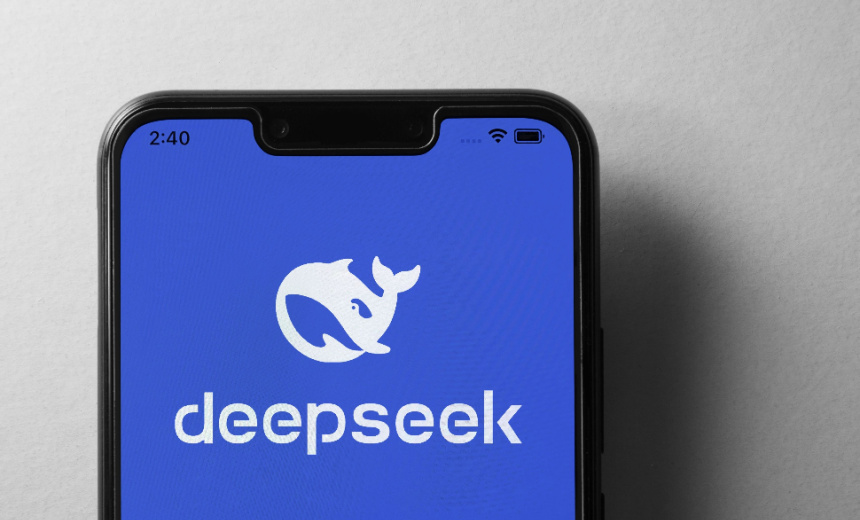Artificial Intelligence & Machine Learning
,
Geo Focus: Asia
,
Geo-Specific
Governments Are Skeptical of Chinese A1 Platform’s Data Security Controls

Countries across Asia are racing to ban government officials, national agencies and critical infrastructure organizations from using Chinese artificial intelligence company DeepSeek’s open-source chatbot application, citing data security and privacy risks.
See Also: OnDemand | Fireside Chat: Staying Secure and Compliant Alongside AI Innovation
The proposed bans, which follow similar actions in Europe and some U.S. government agencies, follows concerns that DeepSeek-R1’s reasoning application collects users’ personal information and their prompts and stores them in China. The platform has also been shown to be vulnerable to jailbreaking attempts and denial-of-service attacks.
The Taiwanese ministry of digital affairs took the first step Friday when it instructed people working at central and local government agencies, critical infrastructure entities, public schools and government-funded organizations not to use DeepSeek AI’s chatbot application.
“DeepSeek AI service is a Chinese product. Its operation involves cross-border transmission, and information leakage and other information security concerns,” the ministry said, signifying Taiwanese distrust for Chinese applications that collect user information. “Government agencies and critical infrastructure should not use DeepSeek, because it endangers national information security.”
The Australian government followed suit Wednesday, saying that the Chinese AI chatbot posed “an unacceptable risk” to national security. ABC reported that the government banned the application from federal government computers and mobile devices.
Data Privacy Concerns
The federal government directive followed local governments in New South Wales and South Australia banning government employees from using DeepSeek AI services on their work devices.
“This is a necessary and prudent measure to protect the security of government information and any information held on behalf of the general public,” said treasurer of South Australia Stephen Mullighan. “I would also urge members of the general public who use DeepSeek to be vigilant and not upload any personal information they may not want to enter the public sphere.”
The bans follow cybersecurity company CyberCX assessing with high confidence that the DeepSeek AI assistant app collects user information from their devices and stores them in China and also produces biased outputs that align with the Chinese Communist Party’s strategic objectives and narratives.
The company said the AI company has to answer to China’s National Intelligence Law that requires private sector organizations to “support, assist and cooperate” with intelligence agencies, including sharing data whenever requested. The Chinese government also influences AI development and audits AI models to ensure they reflect “core socialist values.”
CyberCX said the AI chatbot also collects extensive technical information about users’ devices, such as keystroke patterns, device characteristics and information about how people use the service.
“All organizations, especially critical infrastructure organizations, democratic institutions and organizations storing or processing commercially sensitive or personal information should strongly consider at least temporarily restricting access to the DeepSeek AI assistant app,” the company said.
Harmful for Society
Security researchers at Enkrypt AI said DeepSeek-R1 falls short in ensuring public safety, security and privacy. When prompted with leading questions, the chatbot generated racially discriminative outcomes, prompt injection flaws and content that could pose chemical and biological threats.
Palo Alto Network researchers also demonstrated that DeepSeek’s V3 and R1 models are vulnerable to jailbreaking techniques that embed restricted topics among benign ones. Using these techniques, researchers made the models generate “keylogger creation, data exfiltration and even instructions for incendiary devices, demonstrating the tangible security risks posed by this emerging class of attack (see: DeepSeek AI Models Vulnerable to Jailbreaking).
The South Korean ministry of industry also banned government employees from accessing DeepSeek’s AI chatbot, issuing a guidance to government employees to urge caution when using generative AI services.
Elsewhere in Asia, the Armed Forces of the Philippines said if the government banned the use of DeepSeek AI in the country, it will act quickly to protect the integrity of critical infrastructure and information systems.
Concerns over DeepSeek AI’s data security credentials also gained momentum after security researchers at Wiz found that the company exposed a real-time database to the open internet, allowing researchers to view “a significant volume of chat history, backend data and sensitive information, including log streams, API Secrets and operational details.”
The Italian data protection authority Garante initiated an inquiry into DeepSeek AI’s data storage and processing practices shortly after the company released its chatbot worldwide on Jan. 20. The authority said it is gathering information about “the possible high risk for the data of millions of people in Italy, personal data are collected, from which sources, for what purposes, what the legal basis of the processing is, and whether they are stored on servers located in China (see: European Regulators Probe DeepSeek).”
